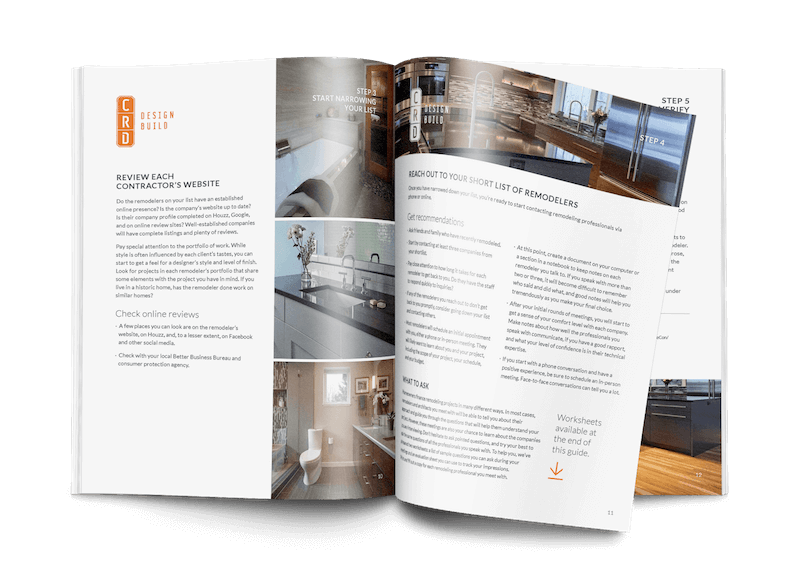
A version of this article appeared in the Seattle Times.
Tax season is once again upon us. If you've recently remodeled your Seattle home or are thinking about renovating in the future, you may be wondering if there is a way to deduct a remodel as part of the equation. After all, you're looking at a big investment, and it sure would be nice to lower your tax liability to soften the blow. While you can't simply deduct the whole thing, there are deductions you should explore.
Deduct the sales tax you paid on your remodel
This is an easy one and can be a big win for homeowners who remodel, especially on high-dollar major renovations, like kitchens, additions, and whole houses. Seattle's sales tax rate of about 10% is one of the highest in the nation, and it pays to deduct the state and local taxes you paid on your home renovation on your federal tax return. (Look up your local tax rate here.) If you are doing a DIY project, save receipts for materials. If you hire a remodeling company, they are acting as your agent in the eyes of the IRS, so it is as if you made the purchases yourself. Ask your remodeler for a summary of sales taxes they collected on your behalf throughout the year. (At CRD, we automatically send these year-end sales tax summaries to all of our clients.)
One thing to note is that you do not have to pay sales tax in Washington State on services, such as design. That's why at CRD Design Build, we bill our design at an hourly rate and do not collect sales tax.
See also: Is state sales tax paid on home construction or renovations tax deductible? [TurboTax FAQ]
Deduct medically related home improvements
If you are a person with a handicap or disability, or if you have a handicapped family member living in your home, you may be able to claim a significant deduction on your federal taxes for medically necessary home improvements. Here are a few examples from the IRS of items you might be able to deduct:
- Construction of entrance or exit ramps to the residence
- Widening doorways at entrances or exits to the residence
- Widening or otherwise modifying hallways and interior doorways
- Installing railing, support bars or other modifications to bathrooms
- Lowering or making other modifications to kitchen cabinets and equipment
- Altering the location or otherwise modifying electrical outlets and fixtures
- Installing porch lifts and other forms of lifts (an elevator, however, may also add to the fair market value of the residence and any deduction would have to be decreased to that extent)
- Modifying fire alarms, smoke detectors and other warning systems
- Modifying stairs
- Adding handrails or grab bars whether or not in bathrooms
- Modifying hardware on doors
- Modifying areas in front entrance and exit doorways
- Grading of ground to provide access to the residence
The above items are just a guide, not an inclusive list. Another thing to keep in mind is that the IRS will only let you deduct the portion of a medical renovation that does not increase the value of your home. For example, if your doctor advises you to install a special pool to help alleviate a medical condition, you may not be able to deduct it because it adds value to your property. However, if the pool costs more than the value it adds, you can deduct the difference.
See also: 7 Smart Steps to Bathroom Universal Design
See also: How to claim a medical deduction for home improvements [MoneyWatch]
Deduct interest paid on a home renovation loan or line of credit
The mortgage interest deduction is one of the most popular itemized deductions Americans take. It allows homeoweners not only to deduct the interest they pay on the mortgage of their primary and second homes, but it allows the deduction of interest on loans secured by your residences, meaning home renovation loans and HELOCs.
At the time of this writing, the deduction has been significantly altered by the Republican tax overhaul legislation: the overall limit was reduced and the ability to deduct interest on a renovation loan or HELOC has changed. These changes will take effect during the 2018 tax year, and we will be publishing another article to clarify the new guidelines shortly. In the meantime, please check with your CPA to determine whether you can still take this deduction.
See also: What tax reform could do to your mortgage interest deduction [Bankrate]
Get a tax credit for solar panel installation
While many of the deductions for energy-efficiency home improvements (such as new insulation) expired in 2013, the solar tax credit was recently renewed. It gives you a whopping 30% federal tax credit for the installation of a new photovoltaic or solar hot water system, including the cost of installation. A tax credit is better than a deduction because it allows you to directly write off that amount from the federal taxes you owe. The 30% gradually steps down to 22% over the course of the next few years, so check the status at the Database of State Incentives for Renewables and Efficiency.
See also: Congress extends solar tax credit—everything you need to know about the federal ITC [energysage]
Lower your capital gains taxes when you sell your home
Some of the biggest tax advantages to be had from a home renovation may come years after you complete your remodel. That's because the money you spend on home improvements can be counted toward your home's adjusted cost basis. In other words, when you sell your home, the IRS will look at the amount you originally paid (your home's basis) and subtract that from the selling price, which is the profit on which you may have to pay capital gains tax. Any qualifying improvements will be subtracted from that amount.
For instance, if you buy your home for $500,000, spend $200,000 on qualified remodeling projects, and eventually sell for $1,000,000, your capital gain will only be calculated at $300,000 instead of $500,000 because of the money you spent on remodeling.
Before you get too excited, keep in mind that under current tax law (which, again may change with the Republican tax bill), you are allowed to essentially write off the first $250,000 of capital gains when you sell your home. That amount doubles to $500,000 for couples filing jointly. But if you sell your home in Seattle, where prices have been rising sharply, you may well find yourself with upwards of $500,000 in profit over what you originally paid.
Improvements vs maintenance
If you decide to track home improvements to lower your capital gains tax on the sale of your home, it's also important to know the difference between what the IRS counts as a legitimate improvement (which you can use to adjust your cost basis) and what's simply maintenance (which you can't deduct). To qualify, a capital improvement must add to the value of your home, prolong its life, or adapt it to new uses. A major remodel or addition counts, especially if you are adding new space, a new HVAC system (but not just an upgrade of an existing system), or a new roof. Things like replacing your existing cabinets with new cabinets or replacing a water heater probably won't count.
See also: Home Improvements and Your Taxes [turbotax]
Going forward
I hope this quick rundown of the potential tax deductions related to remodeling helps get you thinking like an accountant. It should go without saying, but we have to say it anway, that the above info is generalized. Please consult your CPA or other tax expert about your unique situation before taking any action based on this information. If you are interested in remodeling your Seattle home, we would be happy to help. Feel free to get in touch anytime.
Guide to Hiring a Remodeler
This comprehensive guide walks you through all the steps of choosing who will design and build your project, vetting remodeling companies, and ensuring that you have the best experience.



